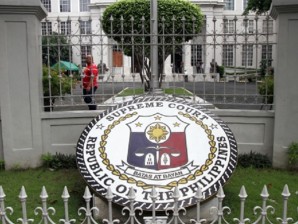MANILA, Philippines—The Supreme Court en banc will convene for the first time in 2013 on Tuesday and on the table will be the controversial reproductive health law, against which a Catholic couple has filed a suit, and the Commission on Election’s disqualification of some party-list groups from the May elections.
The full court will also discuss the request of government prosecutors to suspend for at least a year the implementation of the judicial affidavit rule and finalize how it will go about the Jan. 15 oral arguments on the anti-cyber crime law, which has gone under fire for having tough penalties on online libel.
Supreme Court employees returned to work on Monday after the Yuletide holiday break.
Meanwhile, the new SC spokesperson, Theodore Te, did not assume his new post on Monday, as earlier expected.
“Papers still being exchanged; currently secondment contract still with the University of the Philippines,” Te said in a text message. Te teaches law at UP.
Te also said that lawyer Gleo Guerra would remain to be the acting public information office chief.
Chief Justice Ma. Lourdes Sereno had asked for the inclusion of the issue on judicial affidavit rule in the agenda of Tuesday’s en banc meeting, the SC public information said as early as last week.
Sereno made the directive in response to the request of the Prosecutors’ League of the Philippines for the one-year suspension of the ruling that required the compulsory use of judicial affidavits of witnesses instead of requiring them to give3 direct testimonies in all first level to third-level courts starting Jan.1.
The new rule was meant to address the problem of case congestion and delay in the resolution of cases.
Regarding the suit against the Cyber crime Prevention Act of 2012, justices are expected to issue an advisory on Tuesday on how the oral arguments will be done, according to the SC public information office.
But one of the petitioners, lawyer Harry Roque, earlier said he was among five speakers who had been designated to speak on five topics (each speaker will have 10 minutes to say their piece) that will be subject to questioning by the justices.
The five topics that will be tackled at the oral arguments included the provisions in the law that penalize online libel and the controversial “take down” policy that allows the Department of Justice to order a website violating the law to be blocked.
Expected to be tackled in Tuesday’s meeting was the petition by a Catholic couple asking the high court to declare the responsible parenthood and reproductive health law as unconstitutional.
Likewise, the court will also tackle the status quo orders it issued to more than 50 party list groups that asked it to stop the Comelec from disqualifying them from the May elections.
The latest party-list group to seek help from the high court was the Alliance of Concerned Transport Organizations (ACTO), which filed just last Jan. 4 a petition seeking to stop Comelec from disqualifying it.
In a petition for certiorari, ACTO said Comelec committed grave abuse of discretion when it ignored a resolution of the Comelec’s 2nd division granting ACTO’s registration or accreditation as a sectoral organization under the party-list system of representation.
ACTO asked the court to immediately act on its petition since Comelec had set Jan.20 as the date for the printing of ballots for the May elections.
“It has to ensure that it will be included in the printed ballots and that it has reasonable time to prepare for the electoral exercise,” said ACTO in its 26-page resolution.
